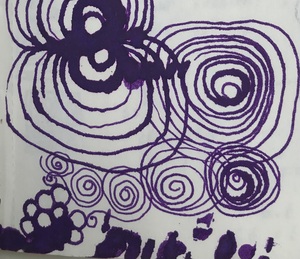 retro html formatted by nom
comments/suggestions to: mjb <at> nomlang.org
retro html formatted by nom
comments/suggestions to: mjb <at> nomlang.org

About looking ahead in the parse token stream with ℕ𝕠𝕞
Pep and nom read the input stream one character at a time. But it is still possible to approximate lookahead with the ℕ𝕠𝕞 script language and the ℙ𝕖𝕡 virtual machine. We do this with the begins-with (B) and the ends-with (E) modifiers for nom tests
The idea of “peeking” ahead to see what parse-token is coming next is important for example when implementing operator precedence in arithmetic expressions.
Here is a simplified arithmetic example. The script below parses arithmetic expressions of the form '(1+2)+3*4+5/6' And places brackets around each sub-expression to show the order of parsing. There is no error checking. See /eg/exp.tolisp.pss for a more complete example with +/- decimal numbers and powers.
read; put;
[0-9] {
while [0-9]; put;
clear; add "expr*"; push; .reparse
}
[-+] { clear; add "opadd*"; push; .reparse }
[*/] { clear; add "opmul*"; push; .reparse }
[()] { add "*"; push; .reparse }
# ignore everything else.
!"" { clear; }
parse>
# watch the parse stack.
add "lines:"; lines; add " char "; chars; add ": "; print; clear;
unstack; print; stack; add "\n"; print; clear;
# implementing lookahead
pop;
pop;
pop;
"(*expr*)*" {
clear; get; ++; get; ++; get; --; --; put;
clear; add "expr*"; push; .reparse
}
# at <eof> no lookahead is required.
(eof) {
"expr*opadd*expr*","expr*opmul*expr*" {
# add brackets to show order of parsing.
clear; add "("; get; ++; get; ++; get; add ")"; --; --; put;
clear; add "expr*"; push; .reparse
}
}
pop;
B"expr*opadd*expr*".!"expr*opadd*expr*" {
# times and divide have higher precedence, so don't reduce
# x+y if it is followed by * or / eg: x+y/3
!E"opmul*" {
# have to use replace because we need to conserve the
# lookahead token.
replace "expr*opadd*expr*" "expr*";
push;push;
# now transfer the attributes in the tape.
# the workspace should be empty
--; --;
# assembling the attribute for the new exp* token
# add brackets to show order of parsing.
add "("; get; ++; get; ++; get; add ")"; --; --; put;
# transfer the attribute for unknown lookahead token
clear; ++; ++; ++; get; --; --; put; clear;
# realign the tape pointer (important!)
++;
.reparse
}
}
push;push;push;push;
(eof) {
pop; clear; get; print; quit;
}
As well as lookahead ℕ𝕠𝕞 can also do lookbehind which is an important parsing technique for only reducing certain token sequences when the tokens 'behind' the current tokens match certain patterns.
The example below is from eg/maths.tolatex.pss and only reduces
mathematical expressions to 'equations' if they are preceded by
nothing or by another equation or a list of equations.
This also shows the importance of popping 3 tokens but only matching 2 tokens. This is because pop;pop;pop; does not guarantee that there will be 3 tokens on the stack.
# nom fragment
pop;pop;pop;
# only 2 tokens, first equation
# discard the semicolon
"expr*;*" {
clear;
add "\\[\n"; get; add "\n"; add "\\]"; put;
clear; add "equation*"; push; .reparse
}
# the sequence expr* ';' preceded by an equation or list of equations.
E"expr*;*" {
B"equation*",B"equationset*" {
replace "expr*;*" "equation*"; push; push;
add "\\[\n"; --; get; add "\n"; add "\\]"; put;
# realign tape pointer
clear; ++; .reparse
}
}
push;push;push;